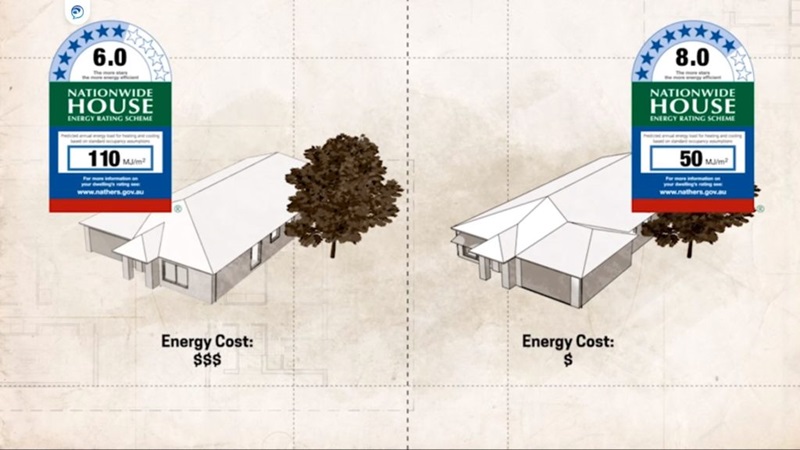When it comes to building or renovating a home in Australia, achieving a high energy efficiency rating is a priority. One of the key tools used to assess this is the Nationwide House Energy Rating Scheme (NatHERS). Many homeowners wonder whether installing solar panels can boost their NatHERS rating. In this blog, we will explore what the NatHERS rating is, how it is calculated, and whether adding solar can improve your score.

What Is the NatHERS Rating?
The Nationwide House Energy Rating Scheme (NatHERS) is an Australian initiative that measures the energy efficiency of residential buildings. It uses a scale from 0 to 10 stars, where a higher score indicates a more energy-efficient home. The rating assesses the thermal performance of a home based on its design, construction materials, and layout. Factors such as insulation, window placement, and shading are taken into consideration.
A 6-star rating is the minimum standard for new homes, as mandated by the National Construction Code (NCC). However, achieving a higher rating, such as 7 or 8 stars, can significantly reduce energy consumption and improve comfort. The question remains: does installing solar panels impact this rating?
How Is the NatHERS Rating Calculated?
NatHERS ratings are calculated using specialised software that models the thermal performance of a building. The software considers factors such as:
- Building Orientation: The direction the house faces can influence how much sunlight it receives.
- Construction Materials: The type of walls, roof, and flooring impact heat retention and loss.
- Insulation Levels: Proper insulation helps maintain a stable indoor temperature.
- Window Placement and Size: The location, size, and glazing of windows affect heat gain and loss.
- Air Leakage: Drafts and gaps can lead to heat loss, reducing energy efficiency.
NatHERS focuses on the design elements that impact a home’s ability to maintain a comfortable indoor temperature without relying heavily on heating or cooling systems. However, it does not directly account for energy generation from solar panels.

Can Solar Panels Improve Your NatHERS Rating?
The direct answer is no. Installing solar panels does not automatically improve your NatHERS rating. The scheme primarily evaluates the building’s thermal efficiency rather than its overall energy consumption or production. Therefore, solar energy generation is not factored into the NatHERS score.
However, installing solar panels can still play a crucial role in enhancing your home’s overall energy efficiency, reducing energy costs, and lowering carbon emissions. Although it may not impact your NatHERS rating directly, it can help meet other energy performance requirements set by local councils or state governments.
The Indirect Benefits of Solar on NatHERS Ratings
While solar panels do not directly influence your NatHERS score, their impact on energy usage can contribute to achieving better energy performance overall. Here’s how:
1. Reducing the Energy Load
Solar panels reduce the demand on your home’s heating and cooling systems by providing a renewable energy source. When you generate electricity from solar panels, you can power your air conditioning, heating, and ventilation systems with clean energy. This reduces your reliance on grid electricity and lowers your energy bills. Although this doesn’t affect the thermal rating, it enhances your home’s energy efficiency profile.
2. Improving Compliance with Building Standards
In some regions, local building codes require new homes to achieve a certain NatHERS rating as part of their sustainability efforts. By installing solar panels, homeowners can offset their home’s energy use and meet additional compliance requirements, such as achieving a Net Zero Energy standard. This is especially true if you are aiming for a high Green Star rating or satisfying local council requirements that focus on overall energy efficiency.
3. Enhancing Market Value
A home with solar panels is often more attractive to buyers, especially those looking for energy-efficient properties. Although the NatHERS rating reflects the home’s thermal performance, adding solar panels can be a selling point that highlights your commitment to sustainable living. The combination of a high NatHERS rating and solar panels can increase your property’s market value.

How to Improve Your NatHERS Rating Effectively
If you aim to boost your NatHERS rating, consider the following strategies:
1. Improve Insulation
High-quality insulation is one of the most effective ways to enhance your home’s thermal performance. Insulating walls, ceilings, and floors can significantly reduce heat loss during winter and heat gain during summer.
2. Optimise Window Placement and Glazing
Properly positioning windows to maximise natural light while minimising heat gain is key. Double-glazed windows are also an excellent investment for reducing heat transfer.
3. Seal Drafts and Gaps
Minimising air leaks in your home can improve energy efficiency. Sealing gaps around windows, doors, and vents reduces unwanted drafts, helping maintain a stable indoor temperature.
4. Choose Energy-Efficient Materials
Selecting materials with high thermal mass, such as concrete or brick, can help regulate indoor temperatures. These materials absorb heat during the day and release it at night, maintaining a comfortable indoor environment.
Maximising the Benefits of Solar Panels
If your goal is to lower your home’s energy usage and environmental impact, installing solar panels is a great step. Here’s how you can make the most of your solar system:
1. Use Energy During Daylight Hours
To maximise the benefits of solar power, use high-energy appliances like washing machines and dishwashers during the day when your solar panels are generating electricity. This reduces your reliance on grid power and enhances your energy savings.
2. Consider Battery Storage
Adding battery storage to your solar system allows you to store excess energy generated during the day for use at night. This reduces your need to draw electricity from the grid and can further enhance your energy efficiency.
3. Monitor Your Energy Usage
Install a monitoring system to track your solar panel output and household energy consumption. This helps you identify areas where you can reduce energy use, maximising your system’s effectiveness.
The Future of Solar and NatHERS
As Australia moves towards a greener future, there are ongoing discussions about integrating renewable energy systems, like solar, into thermal performance ratings. Although NatHERS currently focuses on passive design features, future updates to the scheme may consider on-site energy generation as part of a home’s overall performance. This would provide a more comprehensive view of a property’s energy efficiency and could incentivise more homeowners to install solar panels.
Conclusion
While adding solar panels does not directly improve your NatHERS rating, it still offers significant benefits in terms of reducing energy costs and lowering your carbon footprint. Enhancing your home’s thermal performance through better insulation, window placement, and material choices will boost your NatHERS score. Meanwhile, solar panels contribute to energy savings, making your home more sustainable and appealing to eco-conscious buyers.
For homeowners looking to maximise their energy efficiency and overall performance, combining a high NatHERS rating with a solar power system is an excellent strategy. This approach not only aligns with Australia’s sustainability goals but also provides tangible financial benefits in the form of reduced electricity bills and potential increases in property value.
Investing in both thermal performance improvements and solar technology can ensure your home remains comfortable, energy-efficient, and future-proof.